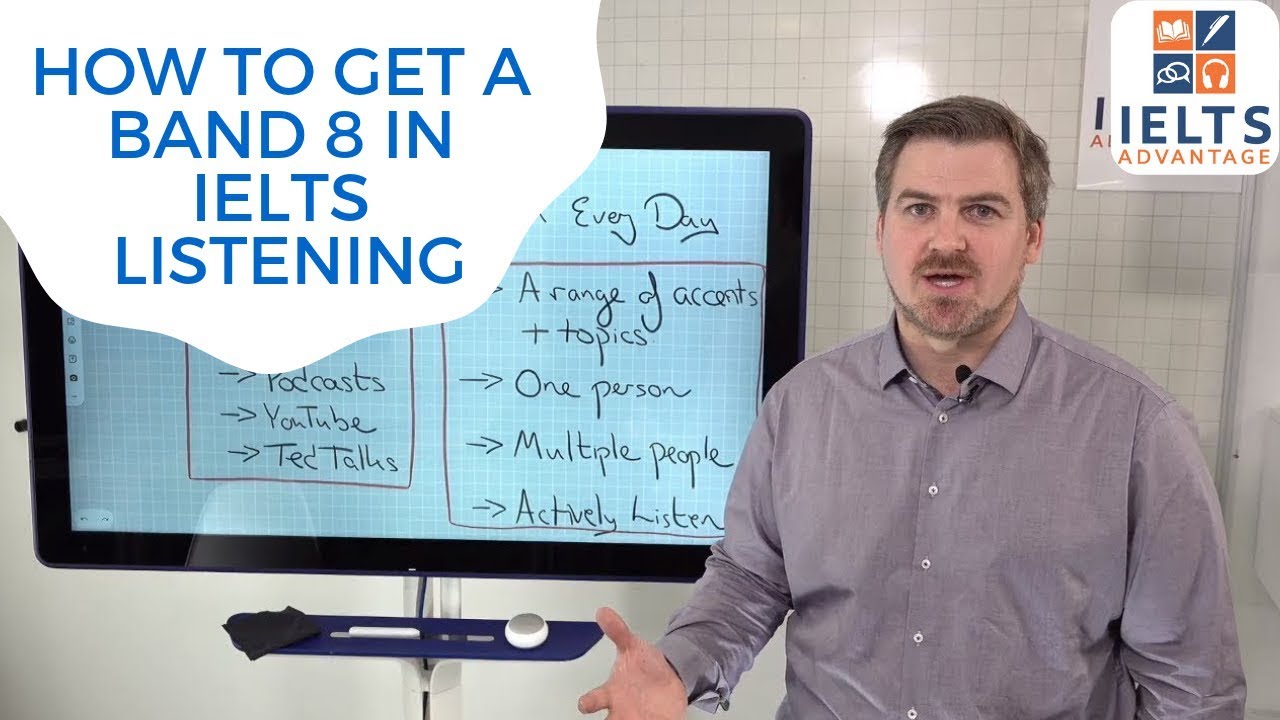IELTS VIP Podcast Episode 13: How Can I Improve my Fluency in the IELTS Speaking Test?
Summary
TLDRIn this IELTS Advantage podcast, Chris addresses a VIP student's question on enhancing speaking fluency. He likens the brain to a computer, suggesting that multitasking, like opening too many tabs, slows performance. To improve fluency, he advises focusing on three main aspects: ideas, grammar, and vocabulary. By making grammar and vocabulary usage more automatic, reducing perfectionism, and being relaxed about ideas, students can significantly boost their fluency. Chris emphasizes that the IELTS speaking test is about effective communication, not the complexity of ideas, and recommends practicing grammar and vocabulary actively to achieve fluency.
Takeaways
- 🧠 The brain, like a computer, can slow down or crash when too many processes are open simultaneously, which is similar to what happens during the IELTS speaking test when one tries to focus on too many aspects like grammar, vocabulary, and ideas.
- 🚴♂️ To improve fluency, automate grammar and vocabulary use through practice, akin to riding a bike or tying shoelaces, which become second nature over time.
- 💡 Focusing on producing perfect sentences can hinder fluency; it's more important to communicate effectively rather than striving for linguistic perfection.
- 🌐 There's a balance between grammar, vocabulary, and fluency; improving the first two will naturally enhance the latter.
- 🤔 Overthinking ideas can reduce fluency; the IELTS speaking test is not about the content of ideas but the ability to communicate in English.
- 🗣️ Practicing using vocabulary actively, rather than passively learning or reading, helps in fluently incorporating it into speech.
- 🎯 The key to fluency is not about having impressive ideas but about the ability to answer questions and develop thoughts in a coherent manner.
- 💭 Reducing the cognitive load during the test by not overthinking can lead to more fluent responses.
- 🌟 Accepting that minor mistakes are part of the learning process can help in reducing hesitation and improving fluency.
- 🌱 Long-term solutions for fluency involve continuous practice and real-life application of language skills to make them more automatic.
Q & A
What is the main focus of the IELTS VIP podcast?
-The main focus of the IELTS VIP podcast is to address questions from VIP students in depth to improve their IELTS preparation, specifically focusing on areas such as fluency in the speaking test.
Why do students often struggle with fluency during the IELTS speaking test?
-Students struggle with fluency because they are trying to manage multiple cognitive processes simultaneously, such as thinking of ideas, grammar, vocabulary, and pronunciation, which can overload their cognitive capacity and slow down their responses.
How does the analogy of a computer with too many open programs relate to the IELTS speaking test?
-The analogy suggests that just like a computer slows down or crashes when too many programs are open, a student's brain can become overwhelmed during the IELTS speaking test if they are trying to process too many language elements at once.
What are the three principal things that students typically think about during the IELTS speaking test?
-The three principal things students think about are ideas for the question, grammar, and vocabulary.
Why is it important to make language use automatic when preparing for the IELTS speaking test?
-Making language use automatic is crucial because it reduces the cognitive load during the test, allowing students to focus more on communication and less on individual language elements like grammar and vocabulary.
How does the speaker suggest improving grammar and vocabulary for better fluency?
-The speaker suggests improving grammar and vocabulary by practicing and using them until they become second nature, similar to how one learns to ride a bike or drive a car without consciously thinking about each step.
What role does perfectionism play in fluency issues during the IELTS speaking test?
-Perfectionism can hinder fluency as students may overthink to produce perfect sentences, leading to hesitations and pauses. The speaker advises relaxing about grammar and vocabulary mistakes to focus more on fluency.
Why should students not focus too much on the content of their ideas during the IELTS speaking test?
-Students should not focus too much on the content of their ideas because the speaking test assesses communication skills, not the depth or correctness of the ideas. The focus should be on effective communication rather than impressing with ideas.
How can students reduce the number of fluency errors they make in the short term?
-In the short term, students can reduce fluency errors by relaxing about making grammar and vocabulary mistakes and not overthinking their ideas.
What long-term strategies does the speaker recommend to improve fluency in the IELTS speaking test?
-Long-term strategies include improving awareness and active use of grammar and vocabulary, and practicing to make their use automatic, as well as accepting that some mistakes are natural and focusing on fluency over absolute accuracy.
Outlines

Этот раздел доступен только подписчикам платных тарифов. Пожалуйста, перейдите на платный тариф для доступа.
Перейти на платный тарифMindmap

Этот раздел доступен только подписчикам платных тарифов. Пожалуйста, перейдите на платный тариф для доступа.
Перейти на платный тарифKeywords

Этот раздел доступен только подписчикам платных тарифов. Пожалуйста, перейдите на платный тариф для доступа.
Перейти на платный тарифHighlights

Этот раздел доступен только подписчикам платных тарифов. Пожалуйста, перейдите на платный тариф для доступа.
Перейти на платный тарифTranscripts

Этот раздел доступен только подписчикам платных тарифов. Пожалуйста, перейдите на платный тариф для доступа.
Перейти на платный тарифПосмотреть больше похожих видео

How to Prepare for the IELTS Speaking Test at Home

IELTS VIP Podcast Episode 10: Should I Get my IELTS Test Remarked?

IELTS VIP Podcast: Top 10 IELTS Myths That Lower Your Score

IELTS VIP Podcast Episode 14: How to Develop Main Ideas in IELTS Writing

IELTS VIP Podcast: Why Are IELTS Writing Scores Always Lower Than The Other Skills?

How to get a Band 8 in IELTS listening
5.0 / 5 (0 votes)
